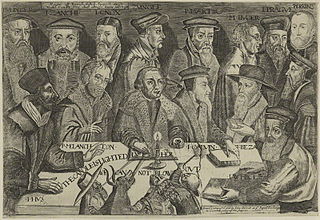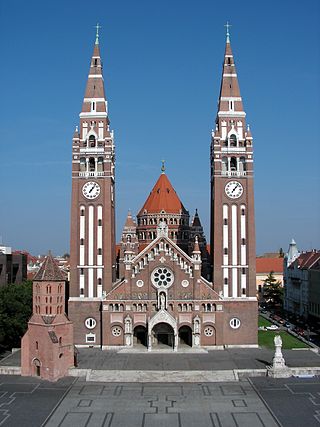
Ordination is the process by which individuals are consecrated, that is, set apart and elevated from the laity class to the clergy, who are thus then authorized to perform various religious rites and ceremonies. The process and ceremonies of ordination vary by religion and denomination. One who is in preparation for, or who is undergoing the process of ordination is sometimes called an ordinand. The liturgy used at an ordination is sometimes referred to as an ordination.
Orthodoxy is adherence to correct or accepted creeds, especially in religion.

The history of religion in the Netherlands has been characterized by considerable diversity of religious thought and practice. From 1600 until the second half of the 20th century, the North and West had embraced the Protestant Reformation and were Calvinist. The southeast was predominately Catholic. Associated with immigration from Arab world of the 20th century, Muslims and other minority religions were concentrated in ethnic neighborhoods in the cities.
Women as theological figures have played a significant role in the development of various religions and religious hierarchies.

The term Evangelical Catholic is used in Lutheranism, alongside the term Augsburg Catholic, with those calling themselves Evangelical Catholic Lutherans or Lutherans of Evangelical Catholic churchmanship stressing the catholicity of historic Lutheranism in liturgy, beliefs, practices, and doctrines. Evangelical Catholics teach that Lutheranism at its core "is deeply and fundamentally catholic". The majority of Evangelical Catholic Lutheran clergy and parishes are members of mainstream Lutheran denominations.

The history of the Calvinist–Arminian debate begins in early 17th century in the Netherlands with a Christian theological dispute between the followers of John Calvin and Jacobus Arminius, and continues today among some Protestants, particularly evangelicals. The debate centers around soteriology, or the study of salvation, and includes disputes about total depravity, predestination, and atonement. While the debate was given its Calvinist–Arminian form in the 17th century, issues central to the debate have been discussed in Christianity in some form since Augustine of Hippo's disputes with the Pelagians in the 5th century.

The Polish Reformed Church, officially called the Evangelical Reformed Church in the Republic of Poland is a historic Calvinistic Protestant church in Poland established in the 16th century, still in existence today.

Religion in Austria is predominantly Christianity, adhered to by 68.2% of the country's population according to the 2021 national survey conducted by Statistics Austria. Among Christians, 80.9% were Catholics, 7.2% were Orthodox Christians, 5.6% were Protestants, while the remaining 6.2% were other Christians, belonging to other denominations of the religion or not affiliated to any denomination. In the same census, 8.3% of the Austrians declared that their religion was Islam, 1.2% declared to believe in other non-Christian religions, and 22.4% declared they did not belong to any religion, denomination or religious community.

Calvinism originated with the Reformation in Switzerland when Huldrych Zwingli began preaching what would become the first form of the Reformed doctrine in Zürich in 1519.
The Edict of Torda was a decree that authorized local communities to freely elect their preachers in the Eastern Hungarian Kingdom of John Sigismund Zápolya. The delegates of the Three Nations of Transylvania – the Hungarian nobles, Transylvanian Saxons, and Székelys – adopted it at the request of the monarch's Antitrinitarian court preacher, Ferenc Dávid, in Torda on 28 January 1568. Though it did not acknowledge an individual's right to religious freedom, in sanctioning the existence of a radical Christian religion in a European state, the decree was an unprecedented act of religious tolerance.

Religion in Namibia is dominated by various branches of Christianity, with more than 90 percent of Namibian citizens identifying themselves as Christian. According to the United States DRL, in 2007 up to 75% were Protestant, including as much as 50% Lutheran.

Religion in Hungary has been dominated by forms of Christianity for centuries. According to the 2011 census, 54.2% of the Hungarians declared to believe in Christianity, of whom 38.9% were Catholics, 13.8% were Protestants, 0.1% were Orthodox Christians, and 1.3% were members of other Christian groups. At the same time, 27.2% of the Hungarians did not declare a religious affliation, 16.7% declared explicitly to be not religious and 1.5% atheists. Minority religions practised in Hungary include Buddhism, Islam and Judaism.

The following outline is provided as an overview of and topical guide to Christianity:

Protestantism is a branch of Christianity that follows the theological tenets of the Protestant Reformation, a movement that began in the 16th century with the goal of reforming the Catholic Church from perceived errors, abuses, and discrepancies.

Johann Sylvan was a Reformed German theologian who was executed for his heretical Antitrinitarian beliefs.
Adam Neuser was a Protestant pastor of Heidelberg who held Antitrinitarian views.












